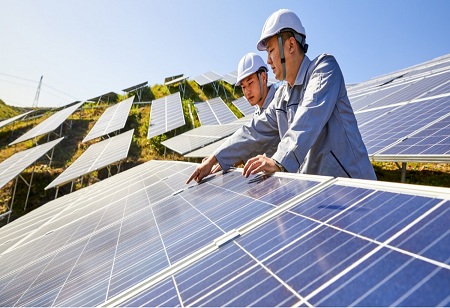
The worldwide push for sustainability, as well as the need to battle climate change, has pushed the use of renewable energy. Decentralized energy systems have emerged as a transformational answer among the different techniques of capturing renewable energy. Decentralized energy is transforming the renewable industry in unprecedented ways by allowing energy generation to take place on a smaller scale and closer to the point of consumption.
However, some argue that renewable energy is not as dependable as non-renewable energy sources such as fossil fuels. They claim that because the sun does not always shine and the wind does not constantly blow, renewable energy is unreliable. Solar panels turn sunlight into electricity. Typically, they are constructed of silicon, a semiconductor material. Solar panels can power tiny electronic gadgets, charge batteries, and provide electricity to homes and businesses. Let us now look at, how decentralized energy is fundamentally transforming the renewable sector.
Local Community Empowerment
One of the most significant effects of decentralized energy is the potential for local communities to be empowered. Traditionally, large-scale power facilities that are generally located distant from end users have dominated energy generation. This centralized strategy not only resulted in transmission losses and inefficiencies, but also hindered local people's engagement in energy production choices.
Decentralized energy systems, on the other hand, encourage community involvement by allowing the construction of smaller, dispersed renewable energy sources like solar panels, wind turbines, and micro-hydro generators. These local energy assets enable communities to become energy producers as opposed to merely consumers. They may create power using renewable resources accessible in their area, decreasing their dependency on centralized fossil-fuel-based systems and cutting carbon emissions.
Furthermore, decentralized energy promotes the development of local energy markets. Excess energy may be put back into the grid, allowing communities to sell excess energy and contribute to the total energy supply. This not only offers people and communities a possible cash stream, but it also creates a sense of ownership and responsibility for sustainable energy methods.
Improving Energy Resilience
The growing frequencies of extreme weather events, as well as the fragility of centralized electricity networks, have underlined the need for energy resilience. Decentralized energy systems play a critical role in improving energy security by dispersing energy generation among several sources. This technique reduces the hazards associated with large-scale outages and assures a consistent supply of electricity, especially during crises.
Microgrids, a type of decentralized energy system, provide localized energy generating and distribution networks that may function independently of the main grid. Microgrids can continue to power vital institutions such as hospitals, emergency shelters, and communication centres in the event of a power loss caused by a natural catastrophe or other interruptions. This capability not only assures community well-being during emergencies but also minimizes the load on centralized grids, allowing for a speedier recovery.
Furthermore, integrating energy storage technology such as batteries with decentralized systems improves their robustness. Excess energy created during peak production periods can be stored and used during times when renewable energy is scarce. This not only enhances energy usage but also helps to stabilize the environment.
“A smart grid is an upgraded electrical infrastructure that employs advanced digital technologies to enable real-time communication, monitoring, and control of electricity generation, transmission, and distribution. This futuristic setup integrates various energy sources, including renewable counterparts like solar and wind, into a streamlined and flexible ecosystem.” Says Shalin Sheth, Founder, And Managing Director, Advait Infratech Limited.
Driving Technological Innovation
Decentralized energy systems are fueling a surge of technical innovation in the renewable energy sector. The need for efficient and cost-effective technology is increasing as towns, businesses, and people invest in localized renewable energy infrastructure. This need is propelling progress in areas such as energy storage, grid management, and smart metering.
Energy storage technologies, in particular, are rapidly evolving. Battery chemistry and design advancements are enabling more efficient and long-lasting energy storage options, allowing for the seamless integration of renewable energy sources into decentralized energy networks. Grid management systems are improving as well to handle the dynamic character of decentralized networks, maximizing energy flows and assuring stability.
Furthermore, the growth of distributed energy is hastening the adoption of digital technology. Consumers may measure their energy use, optimize their energy usage, and make educated decisions to lower their carbon footprint thanks to smart metering and real-time monitoring systems. Decentralized energy systems offer a perfect platform for testing and implementing these digital advances, paving the path for a smarter and more efficient energy future.
The decentralized energy transition of the renewable sector marks a dramatic shift in the way we create, distribute, and use power. This paradigm promotes community empowerment, increases energy resilience, and stimulates technical innovation. Decentralized energy systems provide a viable answer that corresponds with the concepts of sustainability and adaptation as the globe grapples with the issues of climate change and energy security. We can create a more resilient and sustainable energy landscape for future generations if we embrace this shift.
We use cookies to ensure you get the best experience on our website. Read more...